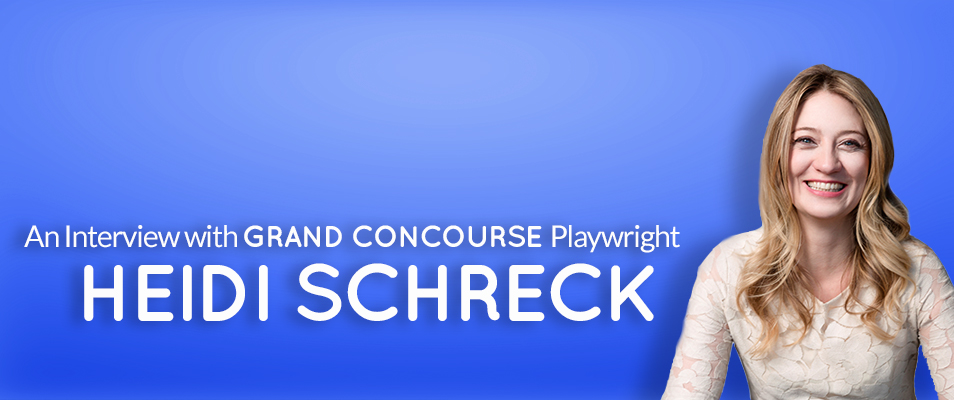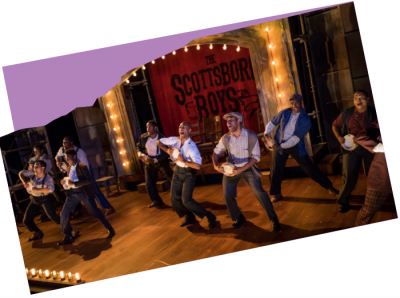Your donation sets the stage for a new season of Boston's most intimate, entertaining and provocative plays and musicals. Our shows make powerful connections with our audiences-- and they are only possible because of you.
Playwright Heidi Schreck




Playwright Heidi Schreck
Heidi Schreck does a little bit of everything: playwriting, acting, television, theatre, and more. To say she is a busy artist is to vastly understate her different talents. Recently, Ms. Schreck spoke with SpeakEasy Artistic Associate Walt McGough, and dug into issues of faith and forgiveness, ‘and what it really means to give and receive help from an organization such as the one depicted in the play.
You started off as an actor, correct?
HEIDI SCHRECK: Yes, acting was definitely my way into theatre. I took a little detour in my 20s and worked as a reporter in Russia; and I guess I was always writing at the same time, but not plays. I wrote for newspapers, and then poems and short stories, but not plays. I think I didn’t know that I wanted to write, but when I was in college I did an acting competition, and I couldn’t find a monologue that I liked so I wrote my own, gave myself a pseudonym, and I ended up winning the competition. So I guess I started off writing material for myself, secretly.
What was the pseudonym?
I wish I could remember. I feel like it was like, Julie, or something.
Grand Concourse is set in a Catholic soup kitchen, and that’s a location that you have a good amount of experience with, right?
I do! I grew up in a really small town in Washington state called Wenatchee. My parents were both public high school teachers, but they also ran a group home for a time, for boys who had run away, or for various reasons, couldn’t live at home. Volunteering at soup kitchens was sort of our Sunday activity. The main one we went to was run through a Lutheran church. I was not raised Catholic, and I’m an agnostic now, but I believe the one that we worked at was a Lutheran-run organization, and then the ones that I volunteered at once I was older and had moved to New York were always Catholic organizations.
What was the first moment of Grand Concourse, for you? What got you writing it?
Actually, I took a workshop with this wonderful playwright named Tanya Barfield, and was feeling very stuck. She does this weekend-long thing where she does exercises, and she has this great exercise called “The Hand,” where you picture a character’s hand and meditate on it, and notice what it’s doing. Right away, the hands that I saw were Shelly’s hands. The person was making soup, and the whole soup kitchen from my childhood kind of came rushing back to me. But that first image was her hands.
Was she a nun right from the get go?
Fairly early on. I’m not sure, honestly, how that emerged. I had worked at places that were founded by Catholic nuns but I’m actually not sure why she ended up being one. Maybe it really was a result of volunteering when I first moved to New York, or because so many of the organizations I worked for were Catholic. I’d been interested in Dorothy Day for a long time, and she wasn’t a nun; but there was that very Catholic approach to forgiveness and service, to help and to devoting your life to vulnerable populations. I think I’ve been interested in that side of things for a long time.
Those questions of forgiveness and service are definitely all over the play.
I didn’t plan it that way, but early on the question that was alive for me in the play was of needing help and giving help, and how complicated both of those things are. I think that’s why I was attracted to the setting of the soup kitchen, because ostensibly you’re divided into the givers of help and the receivers of help, but it’s really more complicated than that. Everybody who is there needs some kind of help, even if they’re in the role of the giver; and everyone’s able to offer something, even if they look like the neediest person. I think that idea was very much alive, and it came out in the characters in the play.
They all have a personal reason for being there; not just an altruistic one.
Right. I spent a lot of time when I moved to New York working for this great social justice organization called Fifth Avenue Committee. They’re really like any work environment; there’s so much that’s good, and then there’s so much that’s dysfunctional. I feel like I found myself often questioning my own motives for giving what I thought was ostensibly help for other people. There’s a constant need to investigate your motives for giving, and making sure that you’re being true to yourself, and not just using it as a way to ignore things in your life that you don’t want to deal with. I have great admiration and respect for the impulse. In fact, one of the most glorious things about the Church, I feel, is its unwavering devotion to vulnerable populations, even while I disagree with so many other things.
What was the biggest surprise for you as the play moved from page to stage?
One big surprise for me has been the audience response to Emma. In every production I’ve seen, and every talkback I’ve attended, people are always incredibly polarized. Some people are really angry and upset, and then there are other people who have more of my personal view of her. I think that I wrote her as basically the worst version of myself at nineteen. Or, not worst, but … extreme. And weirdly, everything that she does in the play makes sense to me. But people have problems with her sometimes, or feel like I’m villainizing her, which honestly I don’t think would ever have occurred to me. So, that part has been surprising, and really interesting, because it’s led to some fascinating discussions and arguments.
It seems very important to the play that she is so much younger than all of the other characters; she still has so much living and learning to do.
Absolutely. I feel like she has, in a way, a much better chance of moving forward and becoming connected to her own sense of forgiveness because of Shelly’s actions at the end of the play. I feel very strongly that that’s actually an act of grace that Shelly performs, which to me makes Emma’s ending feel hopeful.
What are you working on right now?
A couple of new plays; at the moment there’s a commission from the Atlantic for this play called Maritime, which I’m working on. We just did a workshop a couple weeks ago and I’m writing that right now. I’m on a little break from a television show I was working on in the fall, and trying to cram everything in. It’s very tricky.
 Past Productions
Past Productions LAUGHS IN SPANISH
LAUGHS IN SPANISH PRU PAYNE
PRU PAYNE ain't no mo'
ain't no mo' a man of no importance
a man of no importance JAJA’S AFRICAN HAIR BRAIDING
JAJA’S AFRICAN HAIR BRAIDING




